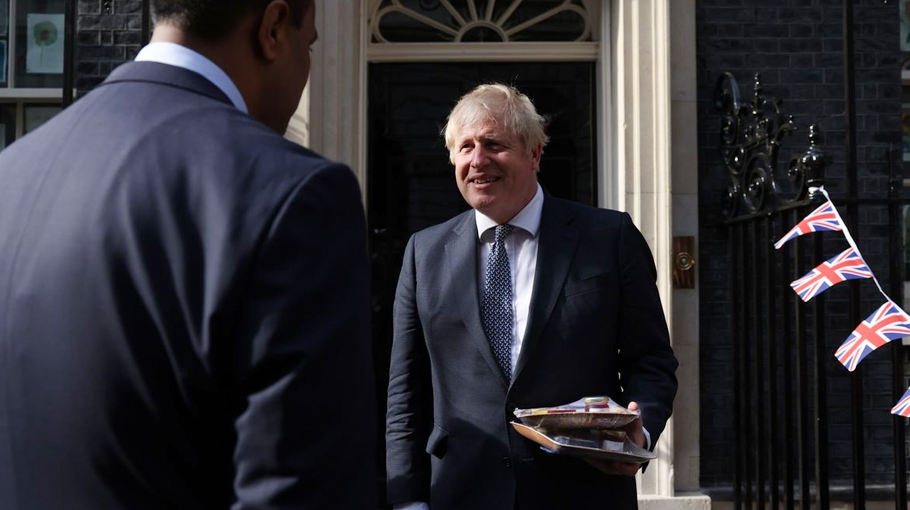As Boris faces ‘partygate’ verdict, Britain’s cost of living crisis spirals

British Prime Minister Boris Johnson is readying himself for another dressing-down over illegal parties in Downing Street, amid warnings that Britain's cost of living crisis is spinning dangerously out of control.
Civil servant Sue Gray is expected to publish her internal investigation into the details of the so-called "partygate" scandal this week, which could include potentially damaging photographs of events.
Mr Johnson has committed to making a statement in Parliament to try and draw a line under the matter.
But the ongoing focus on law-breaking in the premier's offices during the pandemic has proved a major distraction during a period when household bills have soared and consumer confidence has plunged.
Things are only going to get worse, according to Mr Michael Lewis, chief executive of E.ON, one of Britain's biggest energy suppliers. Up to 40 per cent of its customers could be in fuel poverty by October - compared with a fifth now - without substantial action by the government, he told the BBC on Sunday (May 22). A household is in fuel poverty when it spends more than 10 per cent of their income on energy bills.
"In my 30 years in the energy industry I've never seen prices increasing at this rate," Mr Lewis told the BBC. He warned that gas and electricity prices could stay high for another 18 months.
Yet Mr Johnson's government has signalled there is little prospect of imminent extra help for consumers. This month the premier warned that spending taxpayers' money on reducing bills now meant less investment in bringing down bills in the longer-term.
He's under growing pressure to take action, but there appears to be no consensus at the top of government about the right way forward. With less than two years until the next general election, Mr Johnson is eager to paint himself as a prudent guardian of the public purse following the economic shockwaves of the Covid-19 pandemic.
Meanwhile the crisis is worsening.
The gap in inflation experienced by the richest and poorest households in Britain has expanded to its widest level in at least 16 years, according to a report by the Resolution Foundation think-tank.
Soaring energy bills as well as higher food costs have sent Britain's overall inflation rate to a 40-year high of 9 per cent. But headline inflation for the poorest tenth of households is even higher at 10.2 per cent because they spend more of their income on energy bills, according to an analysis by the group.
The inflation gap between the poor and the rich - who face a lower rate of 8.7 per cent - is the widest since records began in 2006, the foundation said.
"As the Government prepares a fresh round of cost-of-living support, it is clear where it's needed most," said Jack Leslie, senior economist at the foundation. "The Chancellor should prioritise significant targeted support at low-and-middle-income households."
The foundation is calling for targeted support to be directed at poorer households through the existing benefits system by increasing universal credit and the state pension, or by boosting employment allowances, winter fuel payments or the warm homes discount.
Britain has seen more than two dozen suppliers go under as they face soaring wholesale costs, but are limited in what they can charge due to the price cap.
Consumer confidence is also at its lowest in almost five decades - worse than even the grim days of the 1970s.
Alongside that, Britain is becoming a less attractive place to do business, according to a survey of more than 100 major investors and business leaders by the Centre for Policy Studies think-tank.
Its report, published on Monday, cited "sharp criticism" of the government for introducing tax rises and failing to "celebrate enterprise and entrepreneurship".
Discussions are active in government, however, over a potential windfall tax on UK energy company profits - which Mr Johnson has played down in recent days.
"We will look at all the options," Education Secretary Nadhim Zahawi told Sky News on Sunday, although he warned the levy could hit pensioners by reducing dividends.
Chancellor of the Exchequer Rishi Sunak has faced opposition from Cabinet colleagues over a windfall tax, with Health Secretary Sajid Javid and Northern Ireland Secretary Brandon Lewis voicing their opposition this weekend.
But even as Mr Johnson battles behind the scenes over the right course of action for struggling households, he will be forced this week to answer questions on the issue that has dogged him for months: the "partygate" scandal.




